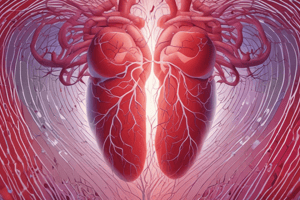Podcast
Questions and Answers
Why is an understanding of how the body's systems interact important?
Why is an understanding of how the body's systems interact important?
- To maintain overall health and well-being (correct)
- To understand how diseases spread
- To comprehend human genetics
- To learn about the history of physiology
What is physiology?
What is physiology?
- The study of the human body's structural composition
- The study of human behaviors and thought processes
- The study of the mechanical, physical, and biochemical functions and processes of living organisms (correct)
- The study of diseases in the human body
What is homeostasis?
What is homeostasis?
- The study of the human body's immune system
- The process of maintaining a stable internal environment despite external changes (correct)
- The body's ability to fight off diseases
- The process of adapting to different climates
When does disease occur?
When does disease occur?
What is the significance of understanding the underlying physiological processes involved in disease?
What is the significance of understanding the underlying physiological processes involved in disease?
How might a physiologist use physiological measurements in the diagnosis of chronic obstructive pulmonary disease (COPD)?
How might a physiologist use physiological measurements in the diagnosis of chronic obstructive pulmonary disease (COPD)?
Which system can be affected by conditions like hypertension, coronary artery disease, and congestive heart failure?
Which system can be affected by conditions like hypertension, coronary artery disease, and congestive heart failure?
What type of conditions can impair lung function and lead to chronic respiratory illness?
What type of conditions can impair lung function and lead to chronic respiratory illness?
Which system can be disrupted by conditions like diabetes, thyroid disorders, and adrenal insufficiency?
Which system can be disrupted by conditions like diabetes, thyroid disorders, and adrenal insufficiency?
What is the ultimate goal of advancing knowledge of physiology according to the text?
What is the ultimate goal of advancing knowledge of physiology according to the text?
Flashcards are hidden until you start studying
Study Notes
Exploring Human Health and Disease: An In-Depth Look at Physiology
Human health and disease are intricately connected with the inner workings of our bodies, which are governed by physiology. Physiology is the scientific study of the mechanical, physical, and biochemical functions and processes of living organisms, including the human body. Here, we delve into the complex and fascinating realm of human health and disease with a focus on physiology.
The Human Body: A Symphony of Systems
Our bodies are made up of several interconnected systems, each playing a crucial role in maintaining our overall health and well-being. Among these systems are the cardiovascular system, respiratory system, nervous system, and endocrine system, among many others. An understanding of how these systems interact with one another is essential for comprehending human health and disease.
Homeostasis: The Body's Intricate Balancing Act
Homeostasis is the body's ability to maintain a stable internal environment despite external changes. This process is essential for ensuring that our body's various systems function effectively, and it is the cornerstone of human health. For instance, the body must maintain a stable pH level, blood glucose concentration, and body temperature.
Disease: A Disruption in the Body's Natural Order
Disease occurs when there is a disruption in the body's normal physiological processes, often due to pathogens, genetic mutations, or environmental factors. Disease manifests in a multitude of ways, including infections, autoimmune disorders, and genetic conditions. Understanding the underlying physiological processes involved in disease is crucial for developing effective treatments and prevention strategies.
The Role of Physiology in Diagnosis and Treatment
Physiology plays a vital role in the diagnosis and treatment of various diseases and conditions. For example, a physiologist might examine respiratory and cardiovascular function in a patient with chronic obstructive pulmonary disease (COPD) to determine the severity of the condition and guide treatment decisions.
Similarly, a physician might use physiological measurements, such as blood pressure readings and heart rate variability, to assess a patient's overall health and identify potential risk factors for heart disease.
Conditions and Diseases Affecting Human Health
Cardiovascular System: Conditions such as hypertension, coronary artery disease, and congestive heart failure can result in a wide range of health problems, including stroke and heart attack.
Respiratory System: Conditions such as asthma, chronic bronchitis, and emphysema can impair lung function and lead to chronic respiratory illness.
Nervous System: Conditions such as Parkinson's disease, Alzheimer's disease, and multiple sclerosis can impair cognitive function and motor control.
Endocrine System: Conditions such as diabetes, thyroid disorders, and adrenal insufficiency can disrupt the body's hormonal balance and lead to a wide range of health problems.
Immune System: Conditions such as AIDS, autoimmune disorders, and allergies can impair the immune system's ability to defend against pathogens and other foreign substances.
In Conclusion
Human health and disease are complex and multifaceted problems that require a deep understanding of the physiological processes that govern our bodies. By studying the natural functions and processes of the human body, we can better understand and address the challenges that threaten human health and well-being.
As we continue to advance our knowledge of physiology, we will be better equipped to prevent, diagnose, and treat the myriad of diseases and conditions that affect human health. It remains our collective responsibility to continue to explore and understand the complexities of human physiology and to use this knowledge to improve the health and well-being of all people.
Studying That Suits You
Use AI to generate personalized quizzes and flashcards to suit your learning preferences.




